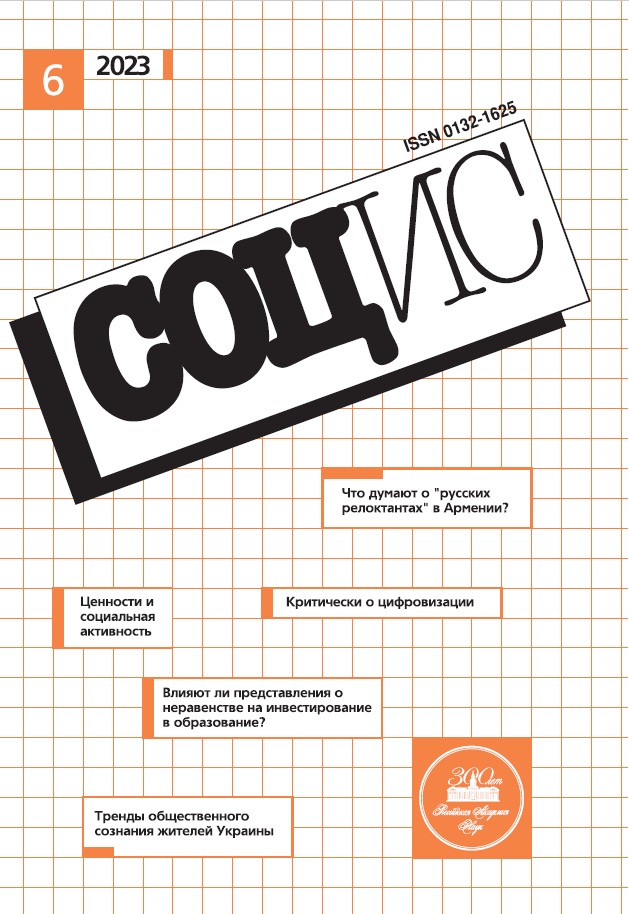Digitalization and Critical Theory of Society
- 作者: Ivanov D.V.1,2, Asochakov Y.V.3
-
隶属关系:
- St. Petersburg state university
- Russian academy of national economy and public administration
- St. Petersburg State University
- 期: 编号 6 (2023)
- 页面: 16-28
- 栏目: Articles
- URL: https://cijournal.ru/0132-1625/article/view/661694
- DOI: https://doi.org/10.31857/S013216250024389-0
- ID: 661694
如何引用文章
详细
The article is presenting а critical analysis of the digitalization discourse which is reflecting not social innovations but managerial and bureaucratic appropriation of virtualization routine practices. Empirical data collected in the authors’ research show digital technologies usage turning into social routine in the Russian largest cities Moscow and St. Petersburg. For a full revealing contradictions and true direction of digitalization, development of critical theory of society is proposed as continuation of the dialectical line of the Frankfurt School neo-Marxism evolution. The totality of domination structures and social control forms in postindustrial society is analyzed on the basis of algorithmic rationality conception introduced by the authors. Algorithmic rationality has replaced technological rationality of the late industrial age. Post-virtualization tendencies and micromovements in everyday life are considered to be an authenticity revolt against total digitalization / coercive virtualization of social life. That authenticity revolt is interpreted as an emancipation potential and escape from the algorithmic rationality realm.
作者简介
Dmitry Ivanov
St. Petersburg state university; Russian academy of national economy and public administrationSt. Petersburg, ul. Vasenko 5/15 app. 46
Yuri Asochakov
St. Petersburg State UniversityRussian Federation, St. Petersburg
参考
- Бальчиндоржиева О. Б., Золхоева М. В. Цифровая культура vs культурная уникальность? (к вопросу о сохранении китайской культурной идентичности) // Социологические исследования. 2022. № 3. С. 90–97. doi: 10.31857/S013216250016858-6.
- Григорьева Е. А. Цифровые неравенства: причины, формы, последствия // Социологические исследования. 2022. № 2. С. 161–163. doi: 10.31857/S013216250017771-1.
- Давыдова А. М., Солянова М. А., Соренсен К. Дисциплинарные практики цифрового селф-трекинга: между эмансипацией и контролем // Мониторинг общественного мнения: экономические и социальные перемены. 2021. № 1. С. 217–240. doi: 10.14515/monitoring.2021.1.1797.
- Иванов Д. В. Виртуализация общества. СПб.: Петербургское востоковедение, 2000.
- Кравченко С.А. Амбивалентности цифровизации: востребованность ее культурно-национальной модели для устойчивого развития // Социологические исследования. 2022. № 9. С. 29–37. doi: 10.31857/S013216250020181-2.
- Немецкая социология / Под ред. Р. П. Шпаковой. СПб.: Наука, 2003.
- Смирнов А. В. Российская социология в условиях цифровизации общества: результаты анализа корпуса научных текстов // Социологические исследования. 2023. № 4. С. 39–50. doi: 10.31857/S013216250022128-3.
- Тавокин Е. П. Искусственность искусственной социальности // Социологические исследования. 2019. № 6. С. 115–122. doi: 10.31857/S013216250005488-9.
- Adorno T., Horkheimer M. Dialektik der Aufklärung. Amsterdam: Querido Verlag, 1947.
- Baudrillard J. Simulacres et simulation. Paris: Galilée, 1981.
- Berry D. Critical Theory and the Digital. London: Bloomsbury, 2014.
- Berry D. Postdigital Constellation // Postdigital Aesthetics. Art, Computation and Design / Ed. by D. Berry, M. Dieter. London: Palgrave Macmillan, 2015. P. 44–57.
- Bilić P. A Critique of the Political Economy of Algorithms: A Brief History of Google’s Technological Rationality // TripleC. 2018. 16(1). P. 315–331.
- Bühl A. Die virtuelle Gesellschaft. Wiesbaden: Verlag für Sozialwissenschaften, 1997.
- Castells M. The Rise of the Network Society. Oxford, UK: Blackwell, 1996.
- Delanty G., Harris N. Critical theory and the question of technology: The Frankfurt School revisited // Thesis Eleven. 2021. Vol. 166(1). P. 88–108.
- van Dijck J., Nieborg D. Wikinomics and Its Discontents: a Critical Analysis of Web 2.0 Business Manifestos // New media & Society. 2009. Vol 11(4). P. 855–874.
- Fisher E. Contemporary Technology Discourse and the Legitimation of Capitalism // European Journal of Social Theory. 2010. 13(2). P. 229–252.
- Fuchs C. Critical Theory of Communication. New Readings of Lukács, Adorno, Marcuse, Honneth and Habermas in the Age of the Internet. London: University of Westminster Press, 2016.
- Fuchs C. Social Media: A Critical Introduction. London: Sage, 2014.
- Fuchs C., Sevignani S. What is Digital Labour? What is Digital Work? What’s their Difference? And why do these Questions Matter for Understanding Social Media? // TripleC. 2013. 11(2). P. 237–293.
- Hassan R. The Condition of Digitality. A Post-Modern Marxism for the Practice of Digital Life. London: University of Westminster Press, 2020.
- Horkheimer M. Traditionelle und kritische Theorie // Zeitschrift für Sozialforschung. 1937. Jg. 6. H. 2. S. 245–294.
- Marcuse H. One-Dimensional Man. Boston: Beacon, 1964.
- Marcuse H. Philosophie und kritische Theorie // Zeitschrift für Sozialforschung. 1937. Jg. 6. H. 3. S. 625-647.
- Selwyn N. What is Digital Sociology? Cambridge, UK: Polity Press, 2019.
- Sharma P., Dash B. The Digital Carbon Footprint: Threat to an Environmentally Sustainable Future // International Journal of Computer Science and Information Technology. 2022. 14(3). P. 19–29.
- Tapscott D. The Digital Economy: Promise and Peril in the Age of Networked Intelligence. New York: McGraw-Hill, 1995.
补充文件









